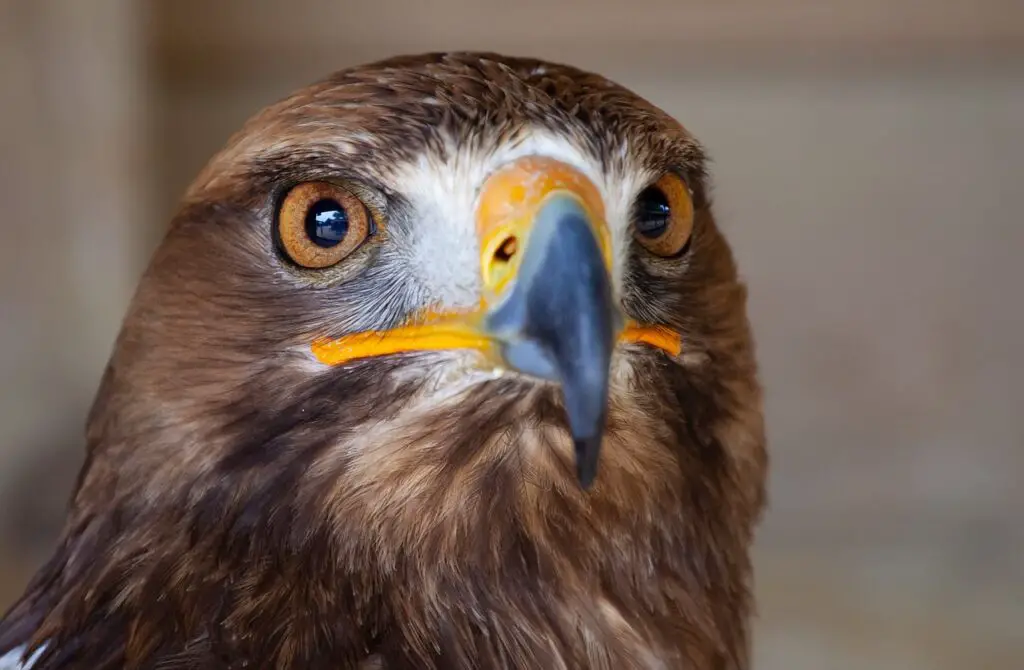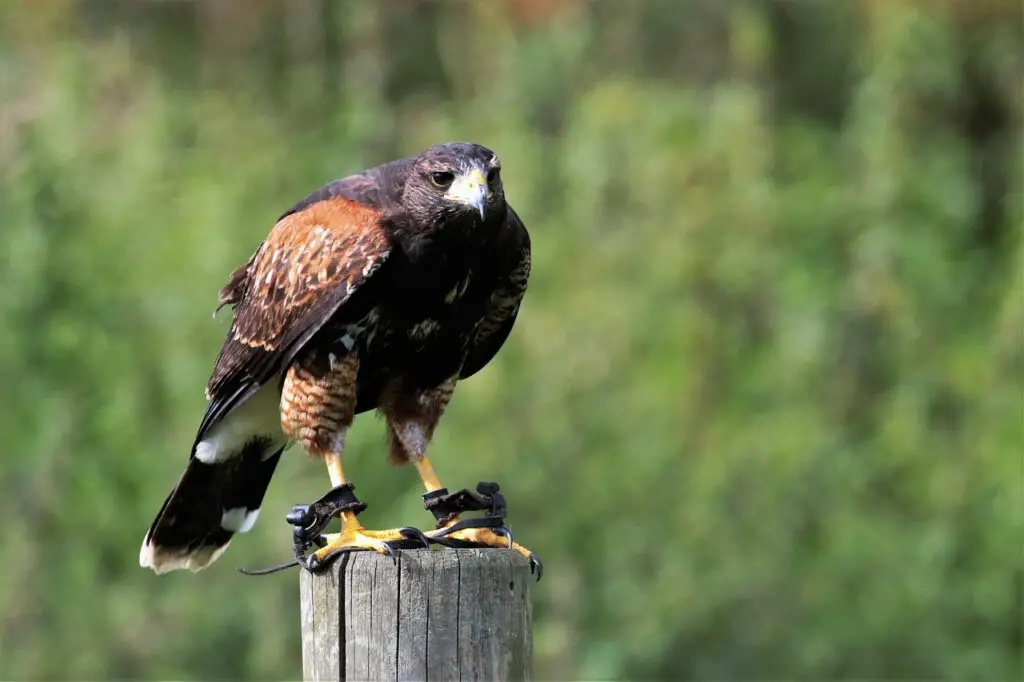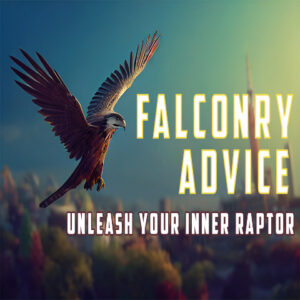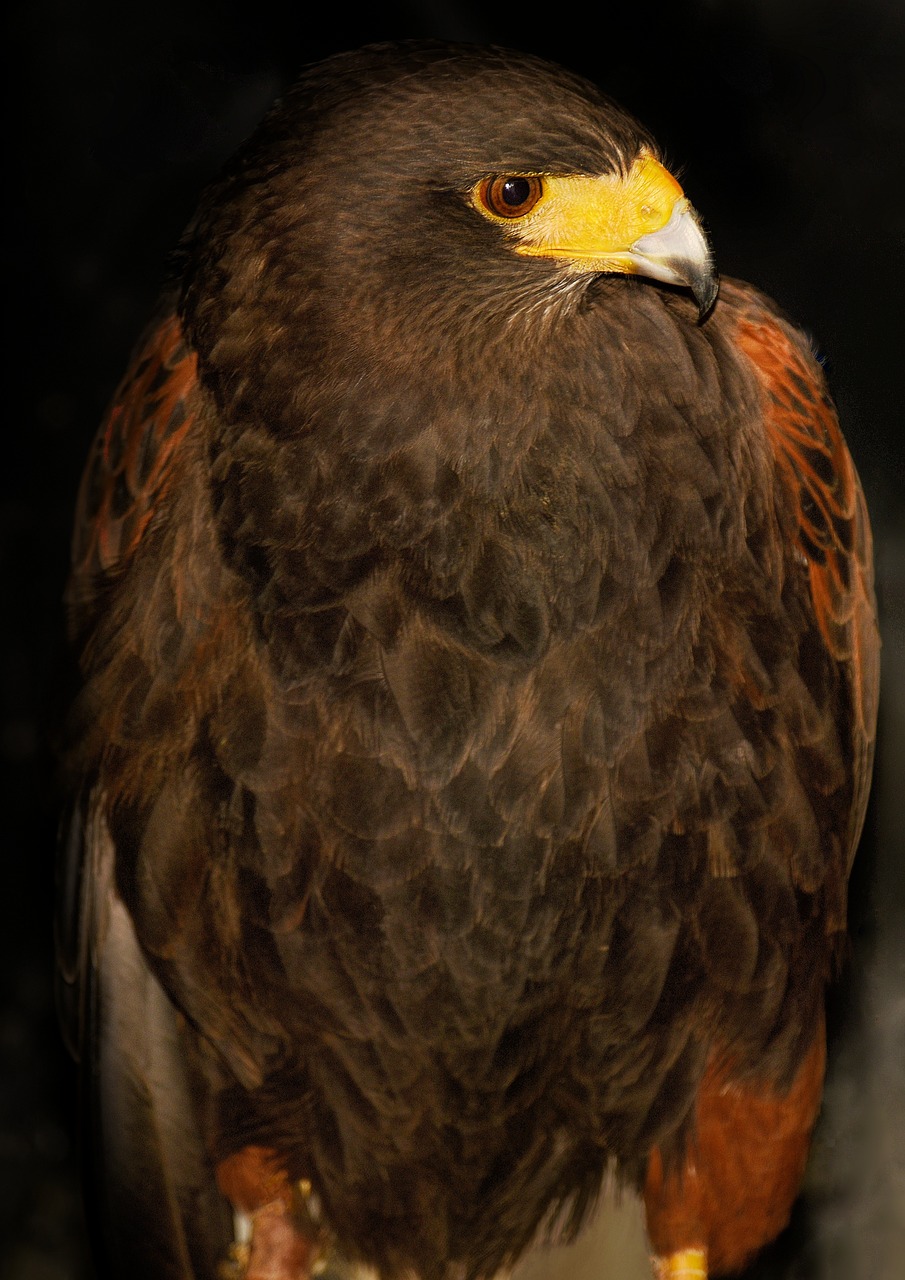Caring for a Harris Hawk demands attention to its diet, housing, socialization, exercise, and health. Feed a carnivorous diet of small mammals, birds, and reptiles on a natural hunting schedule fortified with calcium and vitamin D3. there is so much more to caring for a raptor and I aim to educate you on the basics so your raptor can have the best experiences possible, have a read over the content laid out below which will help you with your Harris Hawk.
How to care for a Harris Hawk
Harris Hawks are a popular choice among falconers due to their intelligence, social nature, and versatility in hunting. However, keeping them as pets or for falconry requires a significant amount of time, effort, and knowledge. The absolute basics you would need to do to own a Harris Hawk would be the following :
Diet

Harris Hawks are natural carnivores and require a diet consisting mainly of smaller mammals such as mice, rats, rabbits, and squirrels. They also enjoy a variety of other small prey, such as birds, reptiles, and insects. It is essential to provide them with fresh food on a natural hunting schedule, usually twice a day, to satisfy their nutritional needs.
Feeding Schedule
Feed your Harris Hawk in the morning and evening, approximately 2-3 hours before roosting time. This schedule mimics their natural hunting behavior and ensures that they get enough food to maintain a healthy weight.
Nutritional Supplements
In addition to a varied diet, it is important to provide your Harris Hawk with supplements such as calcium and vitamin D3. These nutrients are essential for their bone health and overall well-being. Consult with a veterinarian or experienced falconer for the appropriate dosage and frequency of these supplements.
Housing
Harris Hawks require ample space to move around and stretch their wings. When kept as a pet, they should have access to an outdoor enclosure or an aviary that is at least 8 feet wide, 8 feet long, and 6 feet high. This allows them to fly short distances and perch comfortably. In addition, they should have access to a sheltered area where they can roost and protect themselves from harsh weather conditions.
Socialization
Harris Hawks are social birds that form strong bonds with their handlers. It is important to spend time with your hawk every day, either through training or free-flying. This helps strengthen the bond between you and your bird and also keeps them mentally stimulated.
Exercise
In addition to free-flying and hunting, Harris Hawks require regular exercise to preserve their physical health. This can include activities such as flying on a creance (a long line attached to the bird’s leash) or participating in lure courses. It is important to provide opportunities for your hawk to stretch its wings and practice its natural hunting abilities.
Health
Regular health checkups by a vet who specializes in birds of prey are essential for the overall well-being of your Harris Hawk. It is also crucial to keep an eye out for any symptoms of illness or injury, like changes in behavior, loss of appetite, or physical symptoms. Promptly address any health concerns and follow the advice and treatment recommended by your veterinarian.
Grooming and Maintenance for Harris Hawks
Proper grooming and maintenance are crucial aspects of caring for a Harris Hawk. Regular checks and care ensure the bird’s physical condition remains optimal, allowing them to engage in natural behaviors without discomfort or hindrances. Key elements of grooming include beak and talon care, feather maintenance, and general health checks.
The beak and talons require particular attention; they should be checked regularly for overgrowth or damage. In the wild, these parts naturally wear down, but in captivity, they may need to be trimmed by a professional to prevent them from becoming overgrown or causing injury to the bird. Feather maintenance is another vital aspect. Regular bathing or misting helps keep the feathers in good condition, promoting hygiene and enabling the hawk to preen effectively.
General health checks are essential, encompassing inspections for lice, mites, and signs of illness. Monitoring the bird’s weight and behavior daily can provide early indications of health issues that may require veterinary attention. Additionally, ensuring the hawk’s living environment remains clean and safe is a part of overall maintenance, contributing to the bird’s well-being and longevity.

Harris Hawk Diet Requirements
When caring for a Harris Hawk, it is crucial to understand their specific diet requirements to ensure their health and well-being. Harris Hawks are carnivorous birds of prey, and their diet mainly consists of smaller mammals, birds, and reptiles. Establishing a feeding schedule is essential to mimic their natural hunting patterns. I typically feed my Harris Hawk in the early morning and late afternoon to align with their peak hunting times.
Nutritional supplements play a critical role in maintaining the bird’s health. I often provide my Harris Hawk with calcium and vitamin D3 supplements to prevent any deficiencies that may arise from captive diets. Understanding their hunting instincts is crucial as well. Incorporating live prey or simulated hunting activities during feeding can help satisfy their natural instincts.
Weight management is key to ensuring the hawk remains healthy. Monitoring their weight regularly and adjusting their diet and exercise accordingly is necessary. Training techniques like positive reinforcement and consistency are essential for establishing a strong bond and effective communication with your Harris Hawk.
Suitable Housing for Harris Hawks
Ensuring proper housing for Harris Hawks is essential for their well-being and comfort in captivity. When setting up a suitable space for your Harris Hawk, consider the following key factors:
- Nest Box: Providing a nest box in the aviary mimics their natural habitat and gives them a safe space to rest and roost.
- Weather Protection: It’s crucial to have shelter or cover in the aviary to shield the hawks from extreme weather conditions like rain, wind, or excessive sun exposure.
- Perch Options: Offering various perch options of different sizes and textures helps maintain their foot health and prevents soreness or injuries.
- Aviary Size: The aviary should be spacious enough to allow for adequate flying exercise. A larger space encourages natural behaviors and prevents boredom.
- Cleaning Routine: Regular cleaning and upkeep of the aviary are vital for the health and hygiene of the Harris Hawk. Remove droppings, old food, and debris frequently to prevent the buildup of bacteria and parasites.
Socializing Your Harris Hawk
As a falconer who cares deeply for the well-being of my Harris Hawk, I prioritize socializing to build trust and a strong bond with my feathered companion. Training methods involve positive reinforcement with treats for desired behaviors, like coming when called. Understanding behavioral cues is crucial; for example, a raised tail may indicate agitation. When it comes to handling techniques, gentle and consistent handling helps your hawk feel secure. Bonding strategies include spending quality time together and talking soothingly. Setting clear interaction boundaries is essential to establish respect and trust.
| Socializing Your Harris Hawk | |
| Training Methods | Use positive reinforcement for desired behaviors. |
| Behavioral Cues | Learn to interpret cues like tail movements. |
| Handling Techniques | Handle your hawk gently and consistently. |
| Bonding Strategies | Spend quality time together and engage in soothing talk. |
| Interaction Boundaries | Establish clear boundaries for respect and trust. |

Exercise and Enrichment Activities
To maintain the physical and mental well-being of your Harris Hawk, incorporating regular exercise and enrichment activities into its routine is paramount.
When engaging with your Harris Hawk, consider the following:
- Training Techniques: Implement positive reinforcement methods like using food rewards or toys to encourage desired behaviors.
- Enrichment Ideas: Offer various toys, puzzles, and perches to keep your hawk mentally stimulated and prevent boredom.
- Behavioral Cues: Learn to understand your hawk’s body language and vocalizations to better communicate and address its needs.
- Flying Exercises: Provide ample opportunities for your Harris Hawk to soar and exercise its wings, either through free-flight sessions or tethered flights.
- Mental Stimulation: Introduce new environments, sounds, and challenges to keep your hawk’s mind active and engaged.
Observing the hawk’s behavior daily allows for early detection of any changes that might indicate underlying health issues. Any deviations from normal behavior patterns should be noted and discussed with a veterinarian promptly. By staying proactive in health monitoring and veterinary care along with the abovementioned, you can ensure your Harris Hawk leads a long and healthy life full of vitality and vigor.

